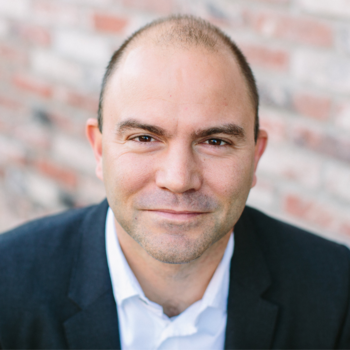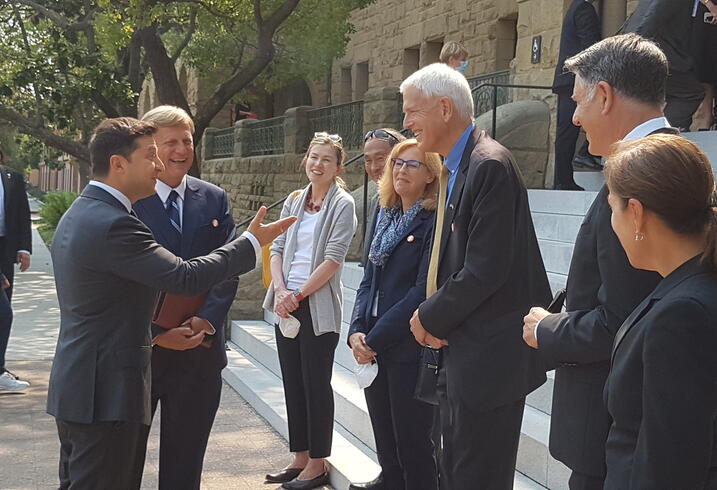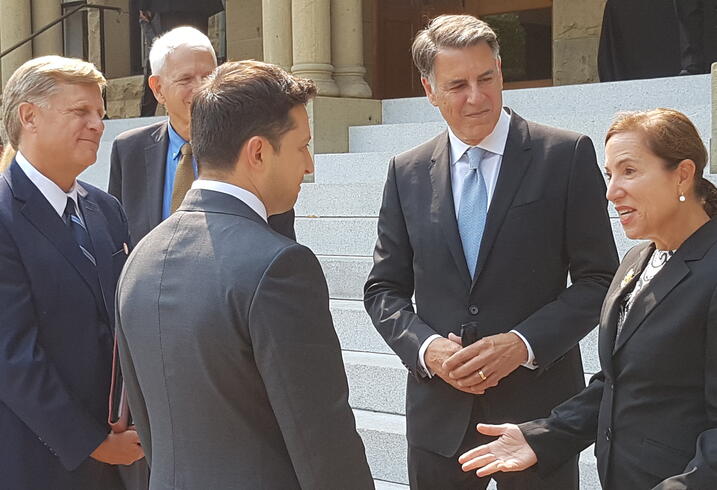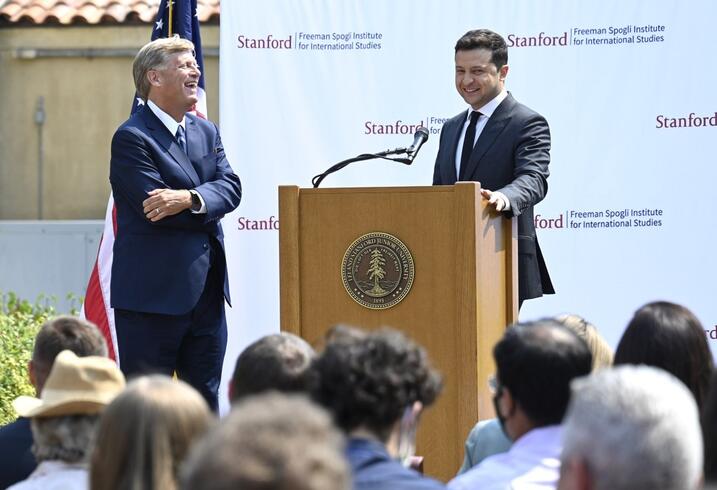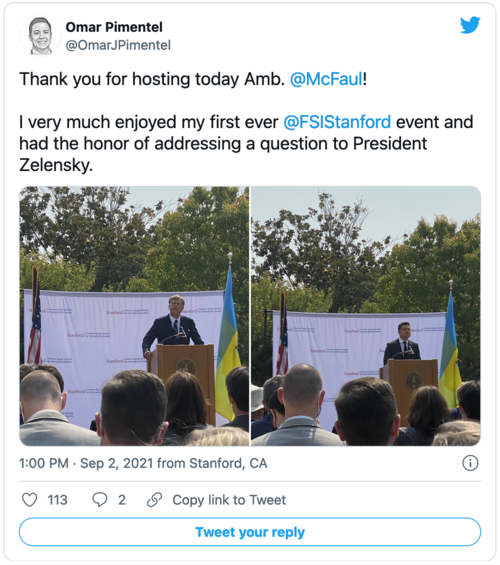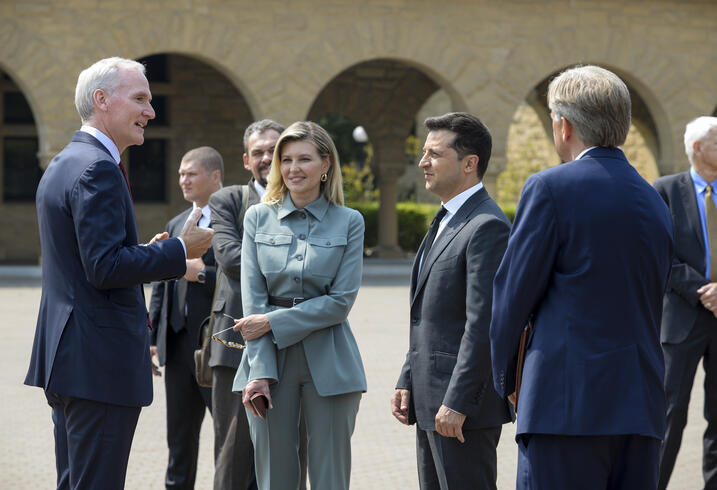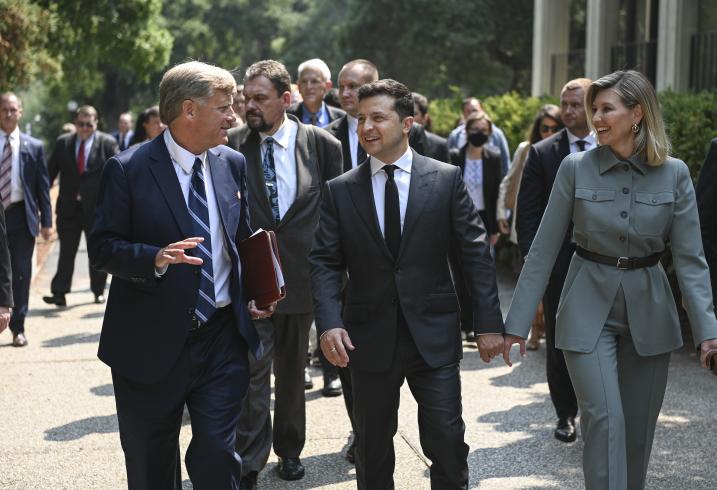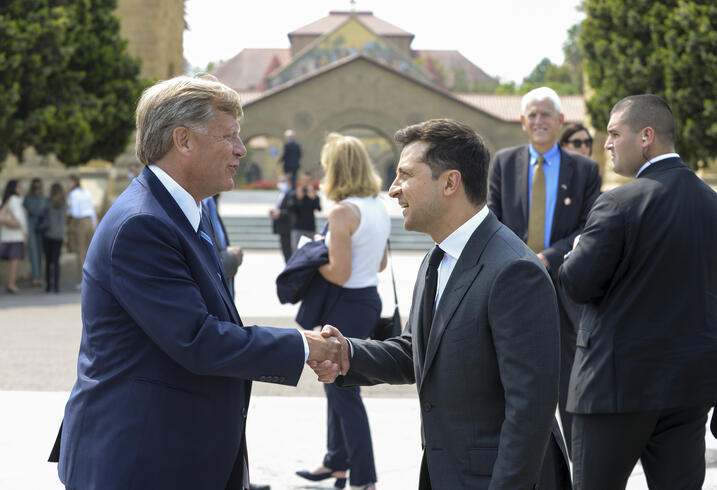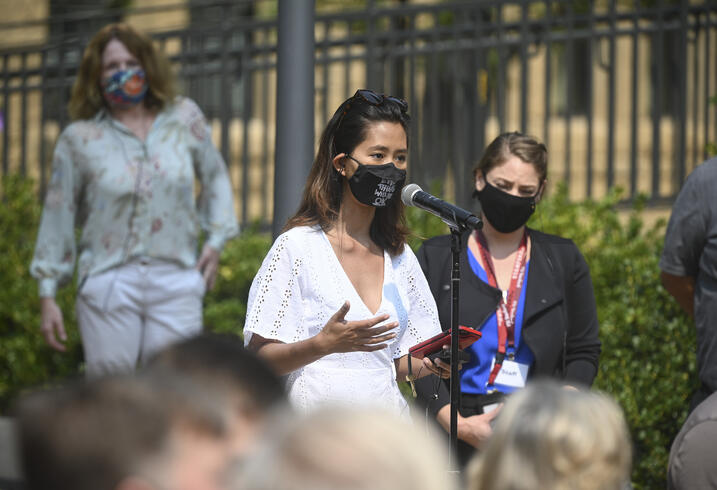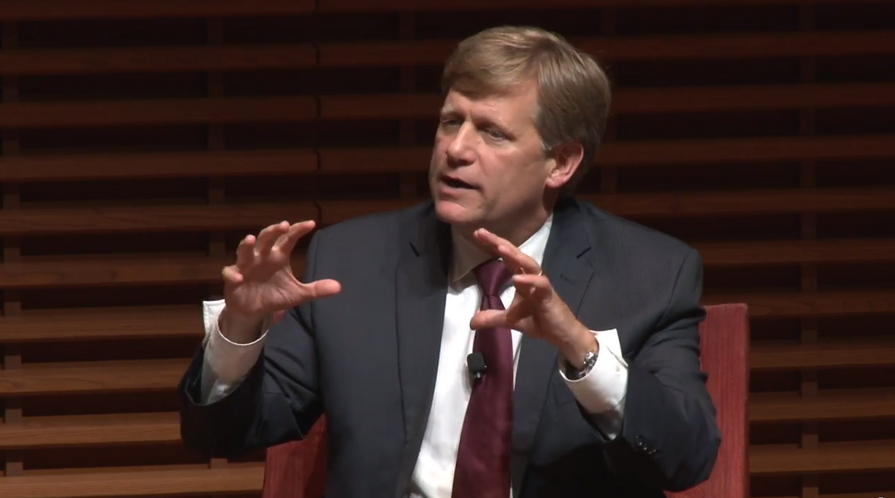In
mid-September, honors students from the Interschool Honors Programs convened by
FSI's Center on Democracy, Development, and the Rule of Law and the Center for
International Security and Cooperation traveled to Washington, D.C., with their
faculty advisors for senior-level meetings and policy briefings. They met with
senior U.S. government officials from the White House, State Department,
Homeland Security, and the intelligence community, with representatives of
international organizations such as the World Bank, and NGOs, think tanks and
other policy forums engaged in international affairs.
CDDRL Policy
Briefings
Led by CDDRL
Director and FSI Senior Fellow Larry Diamond, Deputy Director and FSI Senior Fellow Kathryn Stoner, and FSI's
%people5%, CDDRL students engaged in policy discussions with the National
Endowment for Democracy, USAID, the World Bank, the National Security Council,
the Center for International Private Enterprise, the Inter-American Dialogue and
the Millennium Challenge Corporation.
Sessions were held at the Open Society Institute founded by George Soros
and the Community of Democracies.
Students met at the U.S. State Department with Policy Planning staff and
the Under Secretary for Economic, Energy and Agricultural Affairs for frank
discussions of U.S. policy priorities, the Quadrennial Diplomacy and
Development Review and the transformative effects that emerging economic
powers, such as China, India and Brazil are exerting on trade, credit, investment,
innovation and governance of major and political and economic institutions.
During these
sessions, CDDRL students delved into efforts to advance and secure democracy,
economic development, good governance, rule of law, corruption control, civil
society, and a free media. In the current environment, marked by repression in
many countries, multi-pronged efforts to help ensure that the pluralistic
institutions of a vibrant civil society are allowed to prosper took on particular importance. Another key issue was the role of
information technologies, in building and supporting democracy, by creating a
robust network of activists and promoting collective action.
“It was eye-opening to see the diverse mechanisms through which one can effect positive social change. I learned that it is possible to successfully bridge the two worlds of policy and academe. The meetings made me think about the many different routes to a possible career in the dynamic world of Washington politics.”
Kamil Dada ’11, CDDRL
"A key objective
of the Washington trip is to expose these talented students to the challenges
of policy formulation, implementation, and assessment, as they prepare to write
their honors theses this academic year," said Kathryn Stoner-Weiss. For some
students, it was a first exposure to the policy process in Washington. Others
had interned in policy positions in the nation's capital and overseas, and used
their opportunities in September to report back on findings of their previous
work, renew contacts and glean new insight and information on evolving issues.
"The discussions
we held with senior officials were full, frank, and often, off-the-record to
give the students a firsthand opportunity to engage in candid exchange on major
issues and to pose probing questions," said Larry Diamond, CDDRL Director. "The
players, issues, and dilemmas that arise in the policy process are not always
evident from the outside."
CISAC: Focus on Security Issues
The students in
CISAC's Interschool Honors Program in International Security Studies-led in
Washington by Martha Crenshaw, FSI Senior Fellow and professor (by courtesy) in
the Political Science Department; Lynn Eden, Senior Research Scholar and CISAC
Associate Director for Research; and teaching assistant Michael Sulmeyer, a
CISAC pre-doctoral fellow and third-year Stanford law student-focused on major
national and international security issues, including nuclear weapons policy
like the new START Treaty to reduce nuclear arms and the Nuclear Posture
Review, and counter-terrorism issues such as intelligence gathering and
regional analysis. CISAC students first met with four veteran national security
reporters at The New York Times, and later with members of the intelligence
community, including the Director of the National Counterterrorism Center,
Michael Leiter, and the Chairman of the National Intelligence Council, Christopher
Kojm.
“This was my first visit to Washington, and
I could not have asked for a more comprehensive or enjoyable
introduction to the nation’s capital. The broad array of institutions
and people we experienced was a salient reminder of just how diverse
this country truly is.” Devin Banerjee ’11, CISAC
Students also
met with Paul Stockton, Assistant Secretary of Defense for Homeland Defense and
Americas' Security Affairs. Prior to his government service, Stockton had been
a scholar at CISAC and had taught CISAC honors students for three years. CISAC
students met with Antony Blinken, who serves as National Security Adviser to
Vice President Biden. The students also were exposed to research and
publication think-tanks like the Brookings Institution, RAND Corporation, the
Center for a New American Security and the New America Foundation. At the end
of CISAC's first week in the capital, the students met a dozen Washington-based
alumni of the program over dinner, where alumni provided valuable research
resources and job advice to their younger counterparts.
"The Washington
component of CISAC's honors program provides an invaluable opportunity for our
students to learn how the policy-making process works, explore the complexities
of international security, and test their preliminary ideas about the topic
they have chosen for their honors thesis," said Martha Crenshaw. "In turn, the
officials we meet invariably wish to spend longer with our students, some even
rearranging their schedules (or trying!) to continue a fascinating and candid
conversation."
Highlight:
The National Security Council
A major
highlight of this year's trip, for both the CISAC and the CDDRL students, was a
policy discussion at the National Security Council with two leading Stanford
political scientists and foreign policy experts serving in the Obama
administration. Political Science Professor Michael A. McFaul, former director of
CDDRL and deputy director of FSI, is now Senior Director for Russia on the
National Security Council and the president's top advisor on Russia, and Assistant
Professor Jeremy M. Weinstein, an affiliated CISAC and CDDRL faculty member,
serves as Director for Democracy on the National Security Staff. Students engaged in a lively discussion
of U.S. foreign policy priorities, U.S.-Russian relations, democracy, human
rights and economic development.
"Our honors
students are fortunate to have the chance to engage in high-level policy discussions, especially with Stanford faculty members serving in Washington," said Coit D. Blacker, Director of the Freeman Spogli Institute for
International Studies, who directs the CISAC honors program with Martha
Crenshaw and who, under President Clinton, served as special assistant to the
President and Senior Director for
Russian, Ukrainian, and Eurasian Affairs on the National Security Council.
"Direct exposure to the policymaking process, with
all its promise and pitfalls, will make them better scholars and future thought
leaders."
"I was struck by the innovative ways in which certain agencies approach democracy promotion," said CDDRL honors student Ayeesha Lalji '11. "I think the struggle is often in packaging programs in the right way so that an impervious nation becomes more open to a vital component of social, political, or economic development."
"The
discussions with prominent policy thinkers and current and former senior
officials made a deep impression on our students," said Larry Diamond,
CDDRL Director. "These young people--who will go on themselves to be
leaders in these fields-- got a vivid sense of how the policy process really
works, and why service in government and public affairs is, despite the
frequent frustrations, an exciting and noble mission."
"CISAC's ten days in Washington provide our
students exceptional access to practitioners of various types and at all levels
of the policy world, as well as inside knowledge of today's critical issues,"
said Martha Crenshaw. "The experience also establishes a solid foundation
for a year-long intellectual experience in a weekly research seminar devoted to
producing a thesis that makes an original contribution to the field of
international security."
